During a trip to North Carolina, I visited Carl Sandburg’s farm. If you don’t know who Sandburg is and was, well, he was once one of the most famous persons in America. He was also a famous poet. Forgive me if you know this already—it’s hard to know who knows what these days.
He won two Pulitzer Prizes for his poetry. A third Pulitzer was for his voluminous four-volume history The War Years. When he died in 1967, a memorial was held at the Lincoln Memorial for “The People’s Poet” in Washington, D.C. Thousands of people came to honor his memory. President Johnson spoke and said, in part:
… He seemed able to give voice to the whole range of America’s hopes and America’s hates. He seemed able to communicate, above all, the restless energy that has vitalized, stimulated, and–on occasion–degraded the history of our Nation.
The son of Swedish immigrants, Sandburg was the only poet ever invited to address a joint session of the U.S. Congress; perhaps the first private citizen, as well. He spoke to Congress about Abraham Lincoln, and his speech feels quite in time with today’s American turmoil. Here is Sandburg quoting Lincoln:
“In times like the present men should utter nothing for which they would not willingly be responsible through time and eternity.”
Sandburg’s complete address can be found here.
All that is to point out that Carl Sandburg was once a big deal here in America. A poet who took on huge projects, writing biographies of Lincoln, collecting folk songs for his American Songbook, and often speaking truth to power, standing up for poor, disenfranchised Americans.
 Still relevant today, ay?
Still relevant today, ay?
Or perhaps I’ve put you to sleep with his poem and this talk of Sandburg. *wicked grin*
When I was a kid, ever so long ago, Sandburg was one of the people who taught me about social justice. He didn’t teach me in person, of course, but through the study of his life and words. He was someone who stood up for civil rights; for racial and gender equality, however imperfectly as the white guy he was. Carl Sandburg taught me the rewards of being curious about the world and its people. And, along with many others, he taught me to love poetry.
For over fifty years, poetry has been an anchor for me. It’s often what I reach for when trying to make sense of the world.
Since visiting Sandburg’s farm, I’ve been thinking an awful lot about poetry, what’s happened to America’s relationship to poets, and—more importantly perhaps—reading a lot more of it. All kinds of poetry.
I’m interested in how poetry was once a deep part of our American fabric. Poets such as Sandburg were once household names.
Besides Bob Dylan—who we all know won the Nobel Prize for Literature, right?—how many contemporary, living poets can each of us name today? A few for some of us, none for others, or a lot if you’re poetry centric.
It’s been said that monuments reflect what a culture thinks of themselves, from the Lincoln Memorial in D.C. to the Arc de Triomphe in Paris. Surely poetry reflects the spirit or the soul of a culture. Or at least it used to, and I wonder if it’s possible for poetry to become a greater part of the American fabric once again.
One of my favorite poets, Audre Lorde once wrote,
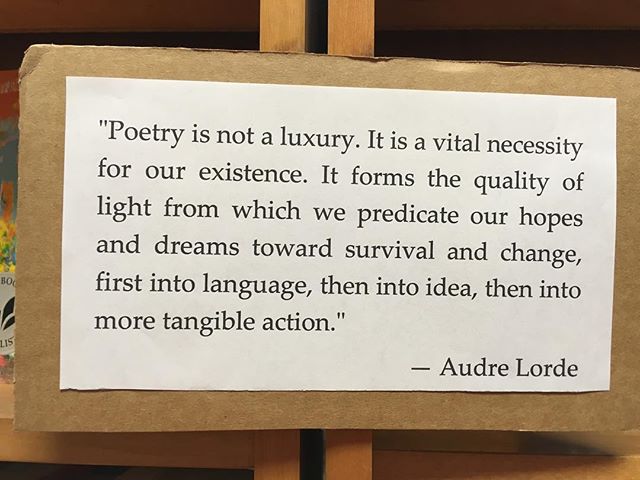
Found this quote at the Unabridged Bookstore in Chicago
Perhaps it’s the Internet that will keep poetry alive and present in our lives. Poetry is not at all the exclusive purview of a certain stereotype: luddites.
Nor is poetry the exclusive concern of those who would tell us who is a great poet and what is a great poem, because who or what speaks to each of us may vary; our ideas no less important. Some of us will find great poetry in hip-hop, some in the lyrics of a Broadway show, others in words scrawled across an abandoned building. Poetry can be read in a book or a magazine, surely, but also on a phone or a tablet.
Sometimes poetry goes “viral” on social media—from Tumblr to Facebook to Twitter to whatever your app may be—all across the world. In response articles abundantly pop-up both in-print and on websites about the poems and poets.
After the November 2015 terrorist attack on Paris, an excerpt from British-Somali poet Warsan Shire’s “what they did yesterday afternoon” was everywhere:
later that night
i held an atlas in my lap
ran my fingers across the whole world
and whispered
where does it hurt?it answered
everywhere
everywhere
everywhere.
Those brief words represented our grief about the world—broken, replete with seeming never-ending violence and death.
In these moments we are unified, mourners across the globe for our friends and stranger-human family. Poetry helps tie us together.
Read the whole of Warsan Shire’s magnificent poem here.
After the 2016 bombings in Brussels, Dorothy Oger, who lost a friend in that attack, wrote the following poem, “For Love,” that went viral:
I shall stand for love,
Even with a broken soul,
Even with a heavy heart.I shall stand for love,
For the world is wounded.
Not just my little piece of land,
Where I am mostly safe,
Where I am mostly well,
But our world, everywhere
Every day.I shall stand for love,
Because we need more light,
Not more deaths,
Not more power,
Not more bombs.I shall stand for love,
So that our children are safe
So that our friends are sheltered
So that our borders are open.I shall stand for love,
Even with a broken soul,
Even with a heavy heart.
Such a powerful expression of grief, love; an ideal to stand up for.
Dorothy’s poem continued to go viral after British MP Jo Cox’s murder, and the shootings in Orlando, Florida at the Pulse nightclub in Orlando.
Also in response to the Orlando shootings another poem went viral. Written by American poet Maggie Smith, “Good Bones” was shared across social media around the world. Unbeknownst to Maggie, she’d written a poem that reached out to us in our communal grief for lives lost.
A poem is often unexpected when it touches us. It can be strangely timely and prescient. Maggie’s poem opens:
Life is short, though I keep this from my children.
A beautiful poem, short, simple, and full of pain and longing for a better world, you can be read in its entirety here.
Sometimes a poem expresses anger and frustration. After the U.S. Presidential election, a poem by British poet Wendy Cope went viral:
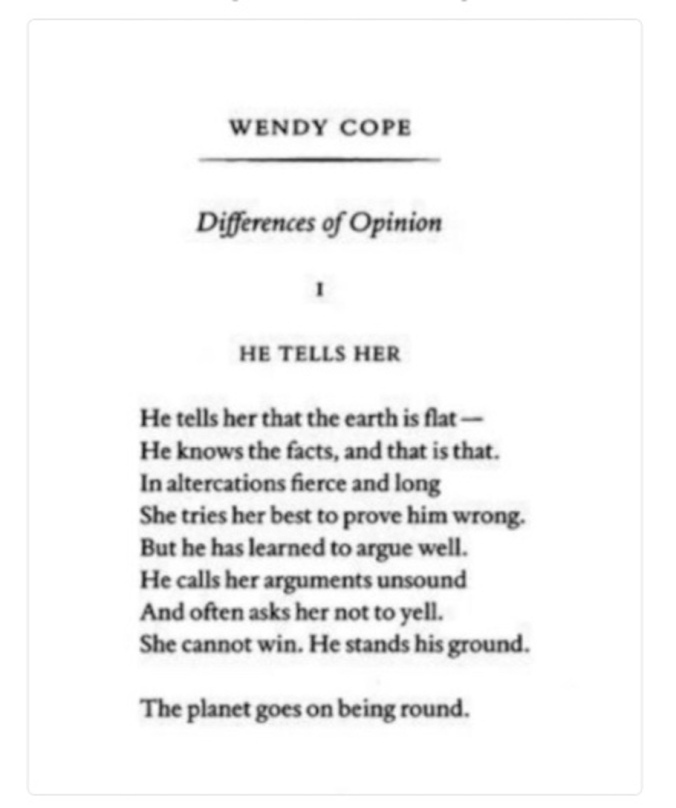
That was not the first time for Wendy’s poem to go viral. There was also the U.K.’s National Poetry Day.
January 2017 saw another Warsan Shire poem go viral on social media. In response to the potential building of a wall at the U.S. border with Mexico, and the proposed ban on refugees from entering the U.S., people began sharing “Home.” Warsan’s poem opens:
no one leaves home unless
home is the mouth of a shark
you only run for the border
when you see the whole city running as well
Who else but a poet can reveal a complex situation in so few words, so clearly in focus? Read her powerful poem in full here.
Some of my friends have told me they read everything except poetry. Perhaps they’re afraid of not being able to understand a poem, or perhaps they find most poetry put in front of them boring. By all means, if a poem bores you move on! But good poetry is not unreachable. Although you might need a little practice in getting used to its cadence if you have been poetry-deprived.
Poetry, I think, can both challenge and heal us. Sometimes it unites us.
Poetry can help us see that we can be greater than we are, or it can make us feel a connection to someone else’s pain or joy. Sometimes poetry entertains us, elevates our thinking. Often it nourishes our souls.
Poet Michael Warr has written,
It is the poets who run toward fear.
They are what we read,
think, and speak,
fighting for greater possibilities.
In my morning reading, I include books of poetry—sometimes relishing a new poem; sometimes being baffled at another. I like to read poetry from many different cultures. I like to seek out the new poets in the world, and those who are unfamiliar to me.
Currently in my morning reading:
- Sleeping with the Dictionary, Harryette Mullen
- Collected Poems, Jack Gilbert (not new or living but many poets talk of his work)
- Commons, Myung Mi Kim
- Of Poetry and Protest: From Emmet Till to Trayvon Martin, Edited & Compiled by Philip Cushway and Michael Warr
Soon, I’ll also be cracking open the Complete Poems of Carl Sandburg to revisit his poetry. Perhaps some of his poems will feel oddly resonant and timely.
I’m not a poet, but often “dirty paper”—and Instagram—to write poems. More than any other form of writing, poetry centers me when the world feels like it’s got nothing to offer but chaos.
Do you have poems you turn to in times of grief, confusion, or joy? Or do you have a practice of dirtying paper with words? I hope you’ll share your own thoughts.
The women behind the poems that went viral can be explored further here:
For any fountain pen friends still reading this post, here’s a gift:
☮ → Carl Sandburg appeared on advertisements for the Parker 51. He was so famous, sometimes his photograph was used without his name in an ad. He also appeared in ads for the Parker 61. He was known to use pencils, as well, like many writers of his generation.
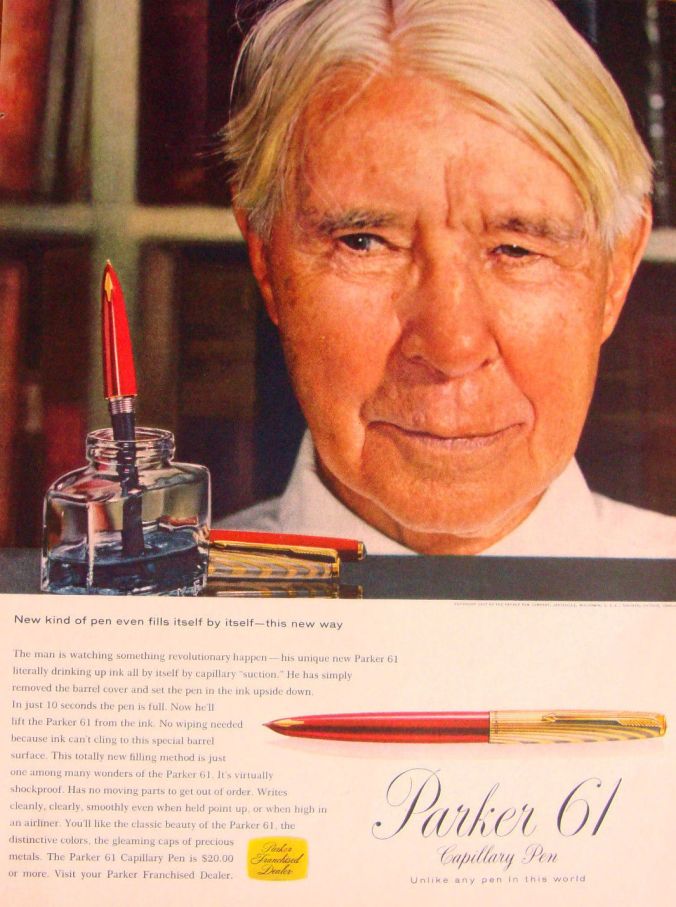
Carl Sandburg ad for Parker 61
Carl and Paula, his wife, moved their family to the Flat Rock farm, known as Connemera, in 1945. There, Carl hoped to find the quietude he wanted for writing his poetry, and Paula was intent on raising goats.
The farm has been a National Historic Park since 1968.
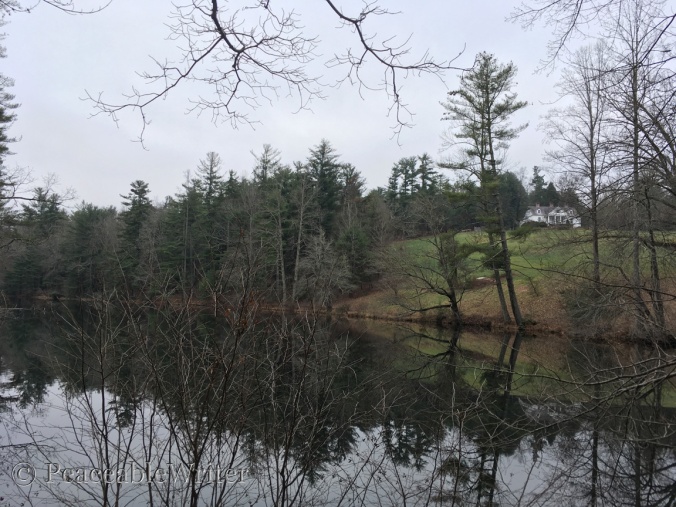
Sandburg National Historic Park—his house in the distance
It is a beautiful place, with a lot of walking trails, a pond, and is complete with direct-descendant Sandburg goats living on the farm.
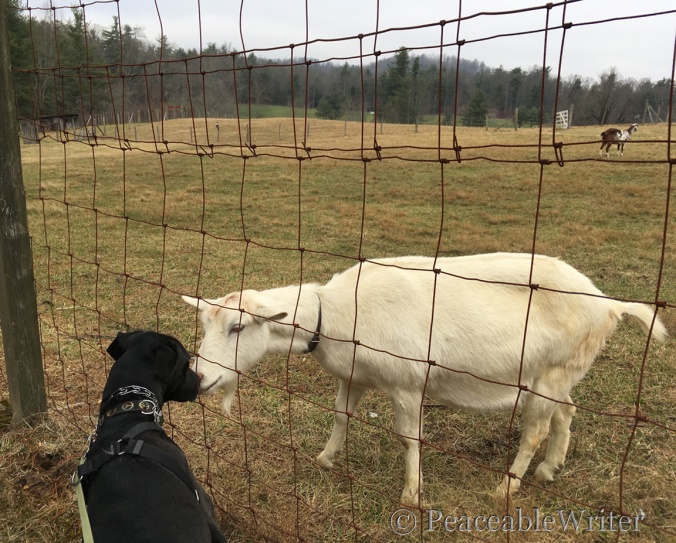
My dog Walker exchanges greetings with a descendent of Paula Sandburg’s goats
Consider a visit to the park if you find yourself near Asheville area. It’s worth it.
Some Reading
- Carl Sandburg National Historic Park
- The Day Carl Sandburg Died
- Bob Dylan Meets Carl Sandburg
- 9 Poems Penned by Presidents
- Poets Wage a Battle in Verse, Nicholas Kristof, NY Times poetry contest
- Kobe Bryant’s retirement poem – an ode to basketball!
- Still Poetry Will Rise, Atlantic Monthly
- Wendell Berry: Poet and Prophet, interview with Bill Moyers
- Let’s change the world one poem at a time, Dorothy Oger’s TEDxSaxionU talk
I am swept away. Very heartfelt, thought-provoking and timely. I vow to read more poetry. Maybe I will even try writing poetry again, after a long hiatus. I want to catch the wave on this one.
LikeLiked by 1 person
Beautiful! It’s a great balm for our hearts.Thank you so much for reading & sharing your reaction, kp.
LikeLike
Fascinating. Thank you. I like lyrics, too.
LikeLike
Thank you for reading, and taking the time to comment, Paul! Most appreciated.
LikeLike